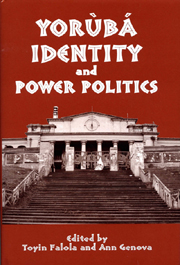Book contents
- Frontmatter
- Contents
- List of Illustrations
- Introduction
- Part I Writing Yorùbá
- Part II Chiefs and Tradition
- Part III Identity and Modern Politics
- 12 Approaching the Study of the Yorùbá Diaspora in Northern Nigeria
- 13 Yorùbá-Nigerians in Toronto: Transnational Practices and Experiences
- 14 Yorùbá Factor in Nigerian Politics
- 15 Politics, Ethnicity, and the Struggle for Autonomy and Democracy
- 16 Petroleum and Ethno-Politics
- 17 Chief M. K. O. Abiọla's Presidential Ambitions and Yorùbá Democratic Rights
- Notes on the Contributors
- Index
16 - Petroleum and Ethno-Politics
from Part III - Identity and Modern Politics
Published online by Cambridge University Press: 12 September 2012
- Frontmatter
- Contents
- List of Illustrations
- Introduction
- Part I Writing Yorùbá
- Part II Chiefs and Tradition
- Part III Identity and Modern Politics
- 12 Approaching the Study of the Yorùbá Diaspora in Northern Nigeria
- 13 Yorùbá-Nigerians in Toronto: Transnational Practices and Experiences
- 14 Yorùbá Factor in Nigerian Politics
- 15 Politics, Ethnicity, and the Struggle for Autonomy and Democracy
- 16 Petroleum and Ethno-Politics
- 17 Chief M. K. O. Abiọla's Presidential Ambitions and Yorùbá Democratic Rights
- Notes on the Contributors
- Index
Summary
Introduction
The average person knows two things about Nigeria: that it is a country rife with political instability stemming from ethnic tension and that embedded within it is one of the world's most valuable oil reserves. What is not widely known is how these two intersect, particularly outside of the Niger delta. In this essay, I introduce the topic of bitumen exploration within Ondó State and insert it into the important discussion of Nigeria's ethnic and political tension. What needs to be emphasized here is the level to which ethnicity and politics played a role in simply the exploration of bitumen (i.e., the idea or possibility of there being bitumen production within the region). Even today exploration remains in the planning stages. Using primarily sources from Nigeria, I look at bitumen prospecting in Ondó State between 1960 and 2003 in southwestern Nigeria-more commonly referred to as Yorùbáland—and the impact it has had on the Yorùbá's relationship with the central government. This essay serves as a point of departure in the arena of connecting petroleum and politics in Nigeria because it introduces the bitumen and the Yorùbá into the discussion of petroleum in Nigeria, which has previously centered only on crude oil production and minority groups in the eastern region. I conclude that bitumen production in Ondó State has been the victim of ethno-political tension within Nigeria.
- Type
- Chapter
- Information
- Yorùbá Identity and Power Politics , pp. 316 - 333Publisher: Boydell & BrewerPrint publication year: 2006



